第3讲 动词(讲义)-2024年小升初英语复习讲练测(全国通用版)(含答案)
文档属性
| 名称 | 第3讲 动词(讲义)-2024年小升初英语复习讲练测(全国通用版)(含答案) | 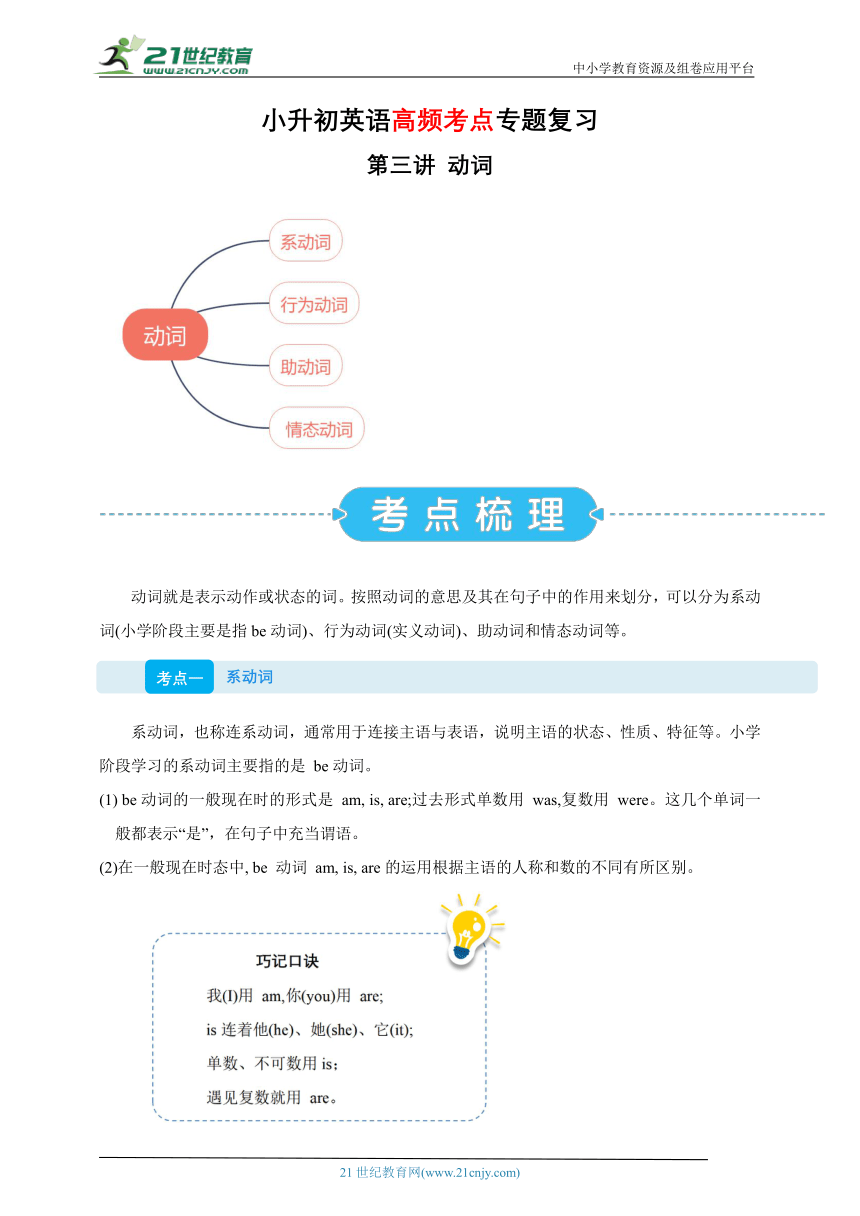 | |
| 格式 | docx | ||
| 文件大小 | 526.7KB | ||
| 资源类型 | 试卷 | ||
| 版本资源 | 通用版 | ||
| 科目 | 英语 | ||
| 更新时间 | 2024-04-11 17:51:14 | ||
图片预览

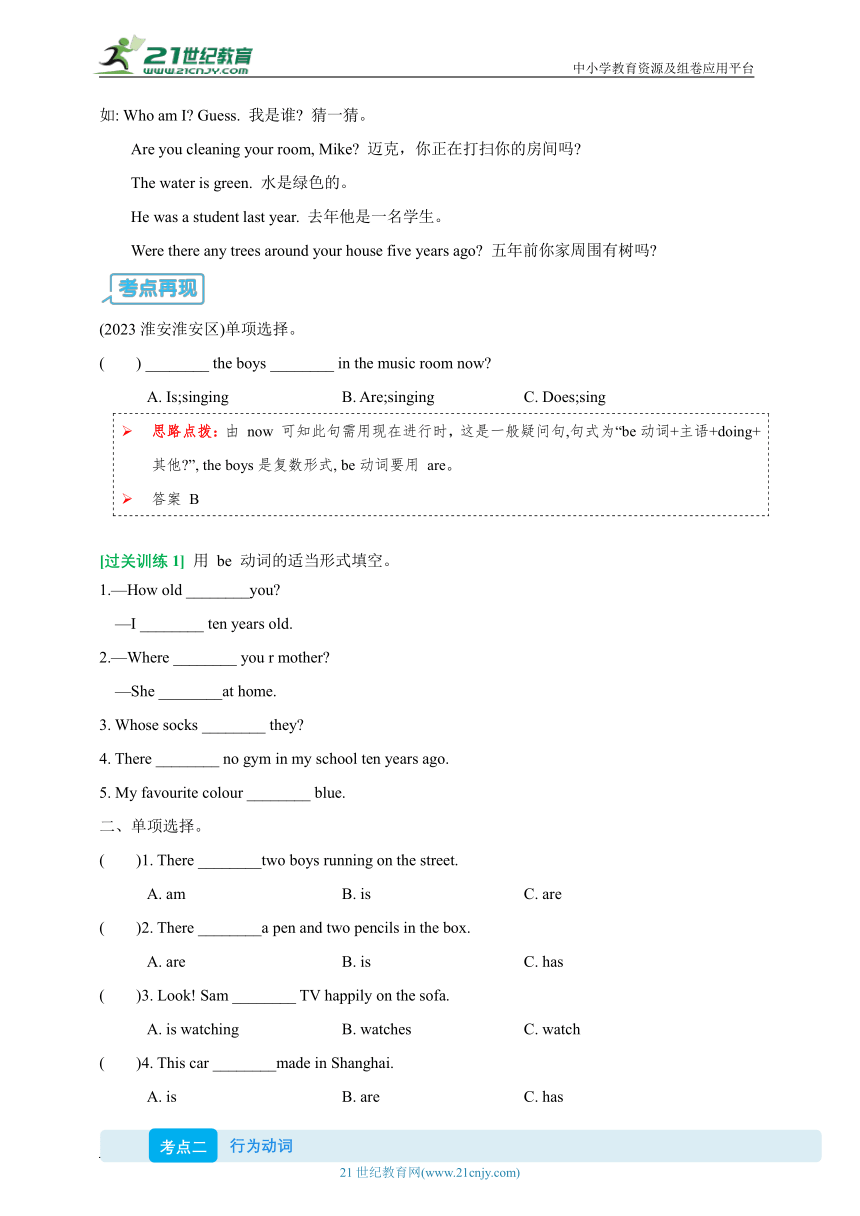
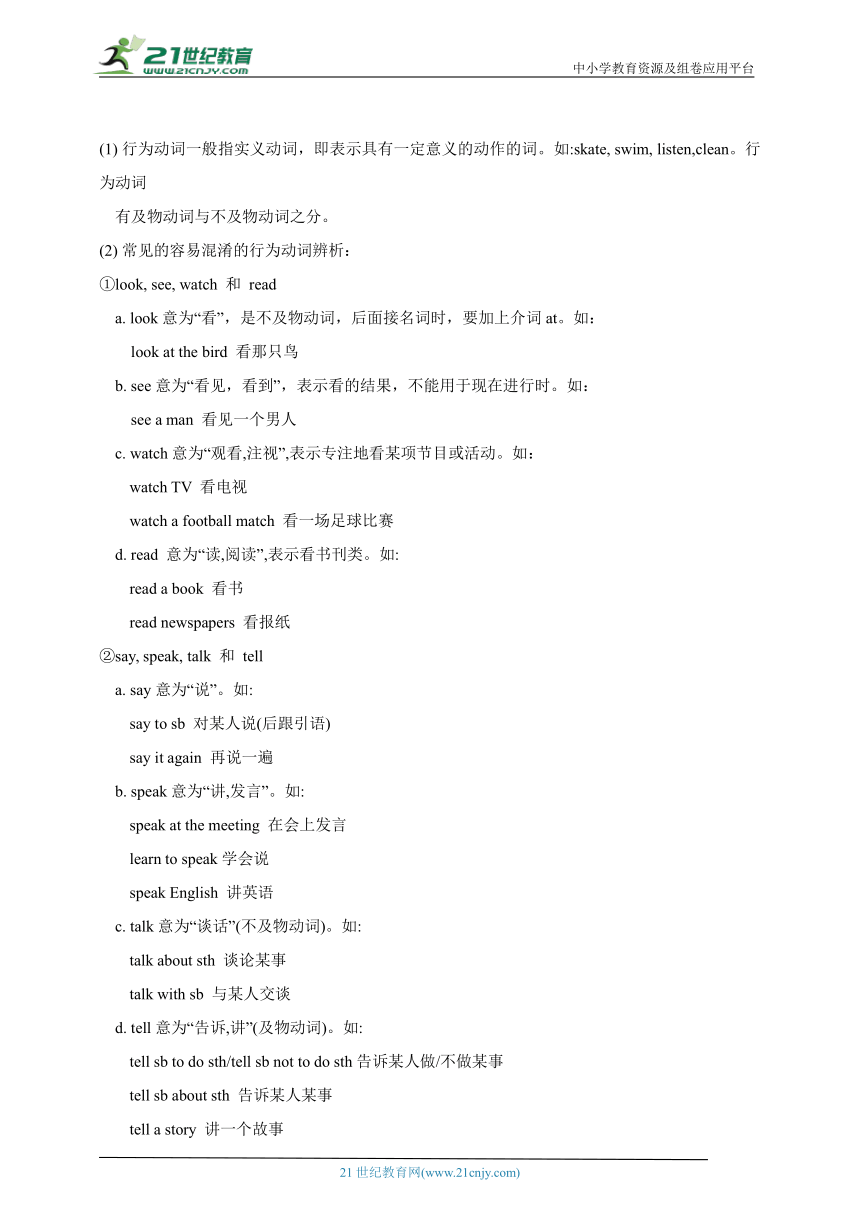
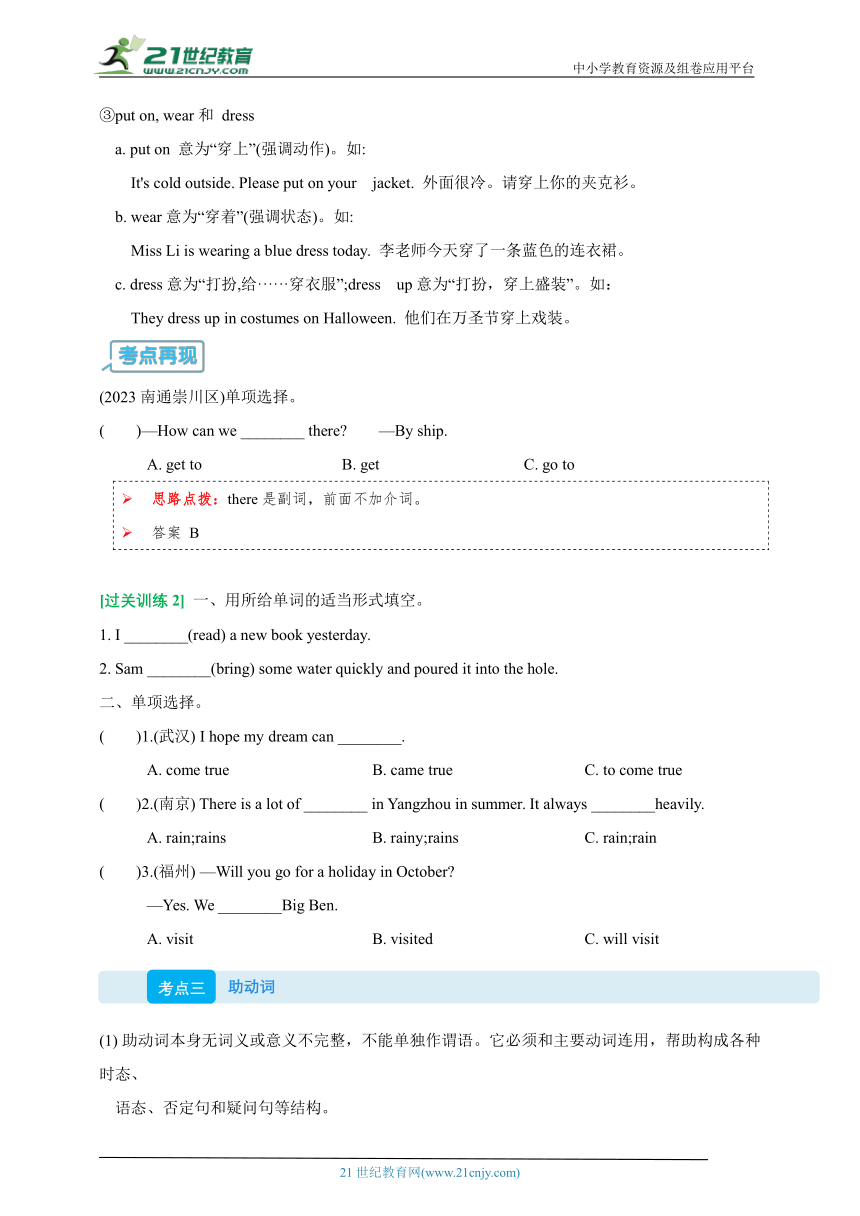
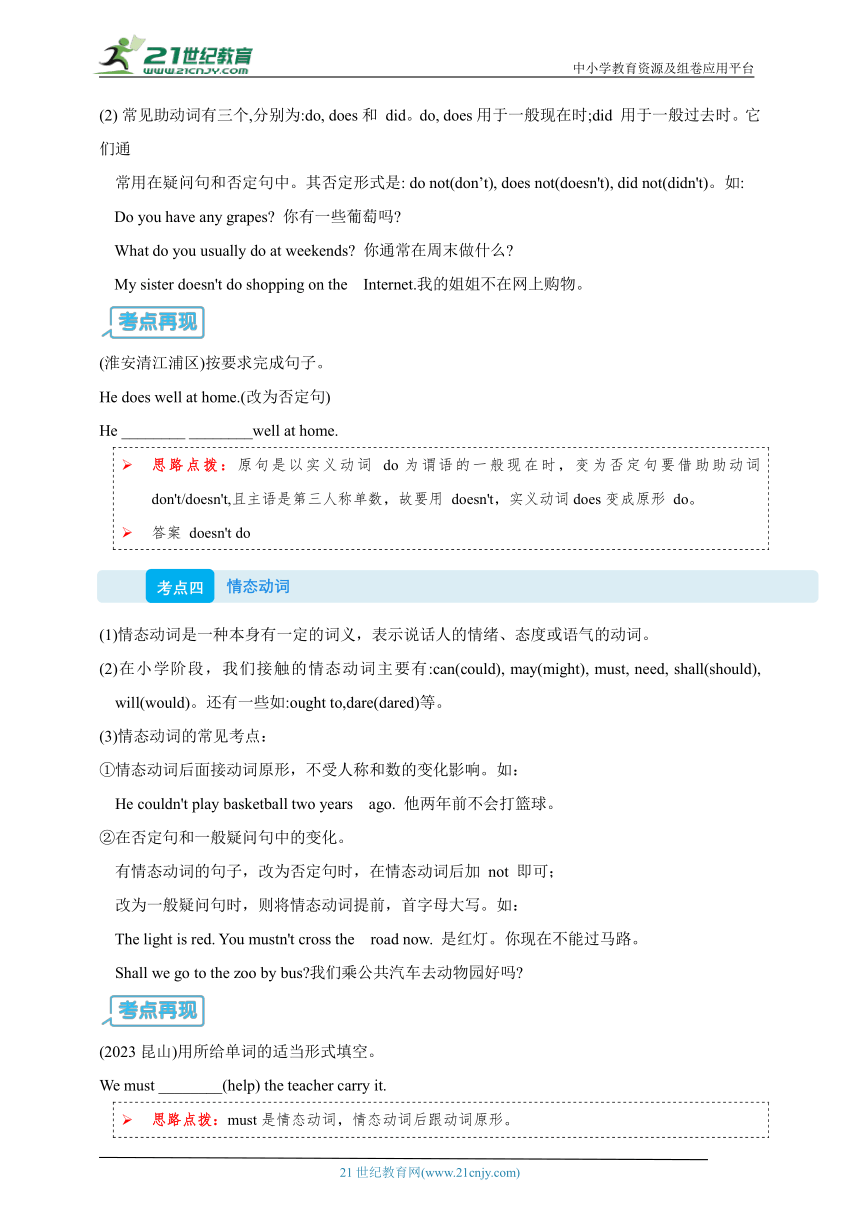
文档简介
中小学教育资源及组卷应用平台
小升初英语高频考点专题复习
第三讲 动词
动词就是表示动作或状态的词。按照动词的意思及其在句子中的作用来划分,可以分为系动词(小学阶段主要是指be动词)、行为动词(实义动词)、助动词和情态动词等。
系动词,也称连系动词,通常用于连接主语与表语,说明主语的状态、性质、特征等。小学阶段学习的系动词主要指的是 be动词。
(1) be动词的一般现在时的形式是 am, is, are;过去形式单数用 was,复数用 were。这几个单词一般都表示“是”,在句子中充当谓语。
(2)在一般现在时态中, be 动词 am, is, are的运用根据主语的人称和数的不同有所区别。
如: Who am I Guess. 我是谁 猜一猜。
Are you cleaning your room, Mike 迈克,你正在打扫你的房间吗
The water is green. 水是绿色的。
He was a student last year. 去年他是一名学生。
Were there any trees around your house five years ago 五年前你家周围有树吗
(2023淮安淮安区)单项选择。
( ) ________ the boys ________ in the music room now
A. Is;singing B. Are;singing C. Does;sing
思路点拨:由 now 可知此句需用现在进行时,这是一般疑问句,句式为“be动词+主语+doing+其他 ”, the boys是复数形式, be动词要用 are。 答案 B
[过关训练1] 用 be 动词的适当形式填空。
1.—How old ________you
—I ________ ten years old.
2.—Where ________ you r mother
—She ________at home.
3. Whose socks ________ they
4. There ________ no gym in my school ten years ago.
5. My favourite colour ________ blue.
二、单项选择。
( )1. There ________two boys running on the street.
A. am B. is C. are
( )2. There ________a pen and two pencils in the box.
A. are B. is C. has
( )3. Look! Sam ________ TV happily on the sofa.
A. is watching B. watches C. watch
( )4. This car ________made in Shanghai.
A. is B. are C. has
行为动词一般指实义动词,即表示具有一定意义的动作的词。如:skate, swim, listen,clean。行为动词
有及物动词与不及物动词之分。
常见的容易混淆的行为动词辨析:
①look, see, watch 和 read
a. look意为“看”,是不及物动词,后面接名词时,要加上介词at。如:
look at the bird 看那只鸟
b. see意为“看见,看到”,表示看的结果,不能用于现在进行时。如:
see a man 看见一个男人
c. watch意为“观看,注视”,表示专注地看某项节目或活动。如:
watch TV 看电视
watch a football match 看一场足球比赛
d. read 意为“读,阅读”,表示看书刊类。如:
read a book 看书
read newspapers 看报纸
②say, speak, talk 和 tell
a. say意为“说”。如:
say to sb 对某人说(后跟引语)
say it again 再说一遍
b. speak意为“讲,发言”。如:
speak at the meeting 在会上发言
learn to speak学会说
speak English 讲英语
c. talk意为“谈话”(不及物动词)。如:
talk about sth 谈论某事
talk with sb 与某人交谈
d. tell意为“告诉,讲”(及物动词)。如:
tell sb to do sth/tell sb not to do sth告诉某人做/不做某事
tell sb about sth 告诉某人某事
tell a story 讲一个故事
③put on, wear和 dress
a. put on 意为“穿上”(强调动作)。如:
It's cold outside. Please put on your jacket. 外面很冷。请穿上你的夹克衫。
b. wear意为“穿着”(强调状态)。如:
Miss Li is wearing a blue dress today. 李老师今天穿了一条蓝色的连衣裙。
c. dress意为“打扮,给······穿衣服”;dress up意为“打扮,穿上盛装”。如:
They dress up in costumes on Halloween. 他们在万圣节穿上戏装。
(2023南通崇川区)单项选择。
( )—How can we ________ there —By ship.
A. get to B. get C. go to
思路点拨:there是副词,前面不加介词。 答案 B
[过关训练2] 一、用所给单词的适当形式填空。
1. I ________(read) a new book yesterday.
2. Sam ________(bring) some water quickly and poured it into the hole.
二、单项选择。
( )1.(武汉) I hope my dream can ________.
A. come true B. came true C. to come true
( )2.(南京) There is a lot of ________ in Yangzhou in summer. It always ________heavily.
A. rain;rains B. rainy;rains C. rain;rain
( )3.(福州) —Will you go for a holiday in October
—Yes. We ________Big Ben.
A. visit B. visited C. will visit
助动词本身无词义或意义不完整,不能单独作谓语。它必须和主要动词连用,帮助构成各种时态、
语态、否定句和疑问句等结构。
常见助动词有三个,分别为:do, does和 did。do, does用于一般现在时;did 用于一般过去时。它们通
常用在疑问句和否定句中。其否定形式是: do not(don’t), does not(doesn't), did not(didn't)。如:
Do you have any grapes 你有一些葡萄吗
What do you usually do at weekends 你通常在周末做什么
My sister doesn't do shopping on the Internet.我的姐姐不在网上购物。
(淮安清江浦区)按要求完成句子。
He does well at home.(改为否定句)
He ________ ________well at home.
思路点拨:原句是以实义动词 do为谓语的一般现在时,变为否定句要借助助动词 don't/doesn't,且主语是第三人称单数,故要用 doesn't,实义动词does变成原形 do。 答案 doesn't do
(1)情态动词是一种本身有一定的词义,表示说话人的情绪、态度或语气的动词。
(2)在小学阶段,我们接触的情态动词主要有:can(could), may(might), must, need, shall(should), will(would)。还有一些如:ought to,dare(dared)等。
(3)情态动词的常见考点:
①情态动词后面接动词原形,不受人称和数的变化影响。如:
He couldn't play basketball two years ago. 他两年前不会打篮球。
②在否定句和一般疑问句中的变化。
有情态动词的句子,改为否定句时,在情态动词后加 not 即可;
改为一般疑问句时,则将情态动词提前,首字母大写。如:
The light is red. You mustn't cross the road now. 是红灯。你现在不能过马路。
Shall we go to the zoo by bus 我们乘公共汽车去动物园好吗
(2023昆山)用所给单词的适当形式填空。
We must ________(help) the teacher carry it.
思路点拨:must是情态动词,情态动词后跟动词原形。 答案 help
[过关训练3] 一、用情态动词或助动词的适当形式填空。
1.She is blind. She ________ see.
2. —What ________you often do on Sunday
—I often play basketball.
3.—________ you clean your room yesterday
—Yes,I ________.
二、单项选择。
( )1. You ________ drink more water.
A. could B. would C. should
( )2.—________ I water the trees on Tuesday
—No, you needn't.
A. Can B. Must C. May
( )3.—________ you like a glass of milk
—Yes, please.
A. May B. Could C. Would
( )4.—________ Fred like football
—Yes, he ________.
A. Does;does B. Do;does C. Does;do
ask for请求; 询问 agree with同意
clean the house 打扫房屋 clean the floor 扫地
collect stamps 集邮 come back回来
come from 来自······ come here 来这里
come in 进来 come on 过来; 加油
come down落下来 come along 随同
dig a hole 挖坑; 挖洞 do housework 做家务
do sports 做运动 do morning exercises 晨练
do some reading 读书 do one’s homework 做作业
draw a picture 画画 drive a car驾车
drink some water 喝些水 fall down落下
get off下车 get on 上车
get to 到达 get up起床
get out of 走出 (……之外) grow up长大
go and have a look 去看一看 go back 回去
go boating去划船 go fishing去钓鱼
go for a walk去散步 go home 回家
go on a diet节食 go out出去
go shopping 去购物 go skating 去滑冰
go skiing 去滑雪 go straight on 直走
go swimming去游泳 go to bed去睡觉
go to school去上学 go to the cinema 去看电影
go to work去上班 have a bath 洗澡
hurry up 快点 had better 最好……
have a Chinese lesson 上语文课 have a cold感冒
have a fever发烧 have a headache 头痛
have a look 看一看 have a good time=enjoy oneself 玩得开心
have a toothache 牙痛 have a rest休息
have a picnic 举行野餐活动 have a try试一试
have a trip 去旅游 have a stomachache 胃痛
have lunch吃午饭 have breakfast吃早餐
have some Coke 喝些可乐 have time 有时间
have fun 玩得开心 have a look=take a look 看
have supper/dinner吃晚饭 hold up举起
keep on (doing sth.)继续(反复)做某事 keep a diary记日记
listen to music 听音乐 listen to the CDs 听CD
listen to the radio 听收首机 laugh at 嘲笑
look for 寻找 let me see 让我想一想; 让我看一看
look at=have a look at 看 look after=take care of 照顾
look around=look about 环顾四周 look out=be careful 当心; 小心
look up 向上看; (在词典中) 查阅 make friends 交朋友
make clothes 做衣服 make the bed 整理床铺
make money 赚钱 make a noise 吵闹
make a face 做鬼脸 make trouble 惹麻烦
make friends with sb. 与某人做朋友 make a mistake 犯错误
be made in 由(某产地) 制造 be made(up) of 由······组成(构成)
pick up 捡起 plant trees 种树
play basketball 打篮球 play badminton 打羽毛球
play cards 打牌 play football 踢足球
play games 玩游戏 play tennis 打网球
play the guitar 弹吉他 play table tennis 打乒乓球
play the piano 弹钢琴 put away 放好; 收起来
put down 放下;扑灭; 平息 put into 添加; 投资; 输入; 使进入
put off延期 put on 穿(衣); 戴(帽)
put on performances 演出 put up 挂起; 张贴; 举起; 抬起; 建造
ride a bike 骑自行车 see a film 看电影
take a message传递信息 take exercise 进行锻炼
take medicine 服药 take photos照相
talk with 与······谈话 think of 认为; 想起
turn down 关小; 调低 take away 拿走
take a taxi 乘出租车 take part in 参加; 参与
take back 带回; 收回 take down 拿下
take a look(at)看一下 take off脱下; 起飞
take…out把……拿出来 turn to转到; 翻到
turn... into...把······变成······ turn off关上(灯、收音机、煤气、自来水等)
turn on 开; 旋开 (电灯、无线电等) wait a moment稍等一下 wait for等候
wash clothes 洗衣服 wash dishes洗碟子
watch TV 看电视 watch a football match 看足球赛
water the flower 浇花 water the tree 浇树
write a letter 写信
单项选择。
( )1. My aunt ________ her baby carefully.
A. looks out B. looks at C. looks after
( )2. He often goes to the playground and ________ games.
A. plays B. looks C. makes
思路点拨:1.本题要结合句子提供的情景和所给动词短语的意思来思考。look out 表示“当心; 小心; 朝外看”, look at表示“看”, look after 表示“照顾”。由baby 和 carefully可推断出用 looks after恰当。 2.本题要结合句子提供的情景和所给动词的意思来思考。由goes to the playground 和 games 可知到操场上是去做游戏, 所以用动词 plays。 答案1. C 2. A
[过关训练4] 单项选择。
( )1. It's 7:30 a. m. We are ________.
A. having breakfast B. having lunch C. having dinner
( )2.(湖北) —Maria, don’t forget to ________the sports shoes. You have a P. E. class today.
—Thanks, mom. I won't.
A. get up B. take off C. put on
( )3. The balls ________ the stairs.
A. is falling B. are falling down C. falling down
( )4. —What did you do last night
—I ________TV and read books.
A. watch B. watched C. have watched
( )5.—May I ________your bike
—Sure.
A. ride B. riding C. rode
过关训练参考答案
[过关训练1]
一、l. are am 2. is is 3. are 4. was 5. is
二、1. C 2. B 3. A 4. A
[过关训练2]
一、1. read 2. brought
二、1. A 2. A 3. C
[过关训练3]
一、1. can’t 2. do 3. Did did
二、1. C 2. B 3. C 4. A
[过关训练4]
一、1. A 2. C 3. B 4. B 5. A
21世纪教育网 www.21cnjy.com 精品试卷·第 2 页 (共 2 页)
21世纪教育网(www.21cnjy.com)
小升初英语高频考点专题复习
第三讲 动词
动词就是表示动作或状态的词。按照动词的意思及其在句子中的作用来划分,可以分为系动词(小学阶段主要是指be动词)、行为动词(实义动词)、助动词和情态动词等。
系动词,也称连系动词,通常用于连接主语与表语,说明主语的状态、性质、特征等。小学阶段学习的系动词主要指的是 be动词。
(1) be动词的一般现在时的形式是 am, is, are;过去形式单数用 was,复数用 were。这几个单词一般都表示“是”,在句子中充当谓语。
(2)在一般现在时态中, be 动词 am, is, are的运用根据主语的人称和数的不同有所区别。
如: Who am I Guess. 我是谁 猜一猜。
Are you cleaning your room, Mike 迈克,你正在打扫你的房间吗
The water is green. 水是绿色的。
He was a student last year. 去年他是一名学生。
Were there any trees around your house five years ago 五年前你家周围有树吗
(2023淮安淮安区)单项选择。
( ) ________ the boys ________ in the music room now
A. Is;singing B. Are;singing C. Does;sing
思路点拨:由 now 可知此句需用现在进行时,这是一般疑问句,句式为“be动词+主语+doing+其他 ”, the boys是复数形式, be动词要用 are。 答案 B
[过关训练1] 用 be 动词的适当形式填空。
1.—How old ________you
—I ________ ten years old.
2.—Where ________ you r mother
—She ________at home.
3. Whose socks ________ they
4. There ________ no gym in my school ten years ago.
5. My favourite colour ________ blue.
二、单项选择。
( )1. There ________two boys running on the street.
A. am B. is C. are
( )2. There ________a pen and two pencils in the box.
A. are B. is C. has
( )3. Look! Sam ________ TV happily on the sofa.
A. is watching B. watches C. watch
( )4. This car ________made in Shanghai.
A. is B. are C. has
行为动词一般指实义动词,即表示具有一定意义的动作的词。如:skate, swim, listen,clean。行为动词
有及物动词与不及物动词之分。
常见的容易混淆的行为动词辨析:
①look, see, watch 和 read
a. look意为“看”,是不及物动词,后面接名词时,要加上介词at。如:
look at the bird 看那只鸟
b. see意为“看见,看到”,表示看的结果,不能用于现在进行时。如:
see a man 看见一个男人
c. watch意为“观看,注视”,表示专注地看某项节目或活动。如:
watch TV 看电视
watch a football match 看一场足球比赛
d. read 意为“读,阅读”,表示看书刊类。如:
read a book 看书
read newspapers 看报纸
②say, speak, talk 和 tell
a. say意为“说”。如:
say to sb 对某人说(后跟引语)
say it again 再说一遍
b. speak意为“讲,发言”。如:
speak at the meeting 在会上发言
learn to speak学会说
speak English 讲英语
c. talk意为“谈话”(不及物动词)。如:
talk about sth 谈论某事
talk with sb 与某人交谈
d. tell意为“告诉,讲”(及物动词)。如:
tell sb to do sth/tell sb not to do sth告诉某人做/不做某事
tell sb about sth 告诉某人某事
tell a story 讲一个故事
③put on, wear和 dress
a. put on 意为“穿上”(强调动作)。如:
It's cold outside. Please put on your jacket. 外面很冷。请穿上你的夹克衫。
b. wear意为“穿着”(强调状态)。如:
Miss Li is wearing a blue dress today. 李老师今天穿了一条蓝色的连衣裙。
c. dress意为“打扮,给······穿衣服”;dress up意为“打扮,穿上盛装”。如:
They dress up in costumes on Halloween. 他们在万圣节穿上戏装。
(2023南通崇川区)单项选择。
( )—How can we ________ there —By ship.
A. get to B. get C. go to
思路点拨:there是副词,前面不加介词。 答案 B
[过关训练2] 一、用所给单词的适当形式填空。
1. I ________(read) a new book yesterday.
2. Sam ________(bring) some water quickly and poured it into the hole.
二、单项选择。
( )1.(武汉) I hope my dream can ________.
A. come true B. came true C. to come true
( )2.(南京) There is a lot of ________ in Yangzhou in summer. It always ________heavily.
A. rain;rains B. rainy;rains C. rain;rain
( )3.(福州) —Will you go for a holiday in October
—Yes. We ________Big Ben.
A. visit B. visited C. will visit
助动词本身无词义或意义不完整,不能单独作谓语。它必须和主要动词连用,帮助构成各种时态、
语态、否定句和疑问句等结构。
常见助动词有三个,分别为:do, does和 did。do, does用于一般现在时;did 用于一般过去时。它们通
常用在疑问句和否定句中。其否定形式是: do not(don’t), does not(doesn't), did not(didn't)。如:
Do you have any grapes 你有一些葡萄吗
What do you usually do at weekends 你通常在周末做什么
My sister doesn't do shopping on the Internet.我的姐姐不在网上购物。
(淮安清江浦区)按要求完成句子。
He does well at home.(改为否定句)
He ________ ________well at home.
思路点拨:原句是以实义动词 do为谓语的一般现在时,变为否定句要借助助动词 don't/doesn't,且主语是第三人称单数,故要用 doesn't,实义动词does变成原形 do。 答案 doesn't do
(1)情态动词是一种本身有一定的词义,表示说话人的情绪、态度或语气的动词。
(2)在小学阶段,我们接触的情态动词主要有:can(could), may(might), must, need, shall(should), will(would)。还有一些如:ought to,dare(dared)等。
(3)情态动词的常见考点:
①情态动词后面接动词原形,不受人称和数的变化影响。如:
He couldn't play basketball two years ago. 他两年前不会打篮球。
②在否定句和一般疑问句中的变化。
有情态动词的句子,改为否定句时,在情态动词后加 not 即可;
改为一般疑问句时,则将情态动词提前,首字母大写。如:
The light is red. You mustn't cross the road now. 是红灯。你现在不能过马路。
Shall we go to the zoo by bus 我们乘公共汽车去动物园好吗
(2023昆山)用所给单词的适当形式填空。
We must ________(help) the teacher carry it.
思路点拨:must是情态动词,情态动词后跟动词原形。 答案 help
[过关训练3] 一、用情态动词或助动词的适当形式填空。
1.She is blind. She ________ see.
2. —What ________you often do on Sunday
—I often play basketball.
3.—________ you clean your room yesterday
—Yes,I ________.
二、单项选择。
( )1. You ________ drink more water.
A. could B. would C. should
( )2.—________ I water the trees on Tuesday
—No, you needn't.
A. Can B. Must C. May
( )3.—________ you like a glass of milk
—Yes, please.
A. May B. Could C. Would
( )4.—________ Fred like football
—Yes, he ________.
A. Does;does B. Do;does C. Does;do
ask for请求; 询问 agree with同意
clean the house 打扫房屋 clean the floor 扫地
collect stamps 集邮 come back回来
come from 来自······ come here 来这里
come in 进来 come on 过来; 加油
come down落下来 come along 随同
dig a hole 挖坑; 挖洞 do housework 做家务
do sports 做运动 do morning exercises 晨练
do some reading 读书 do one’s homework 做作业
draw a picture 画画 drive a car驾车
drink some water 喝些水 fall down落下
get off下车 get on 上车
get to 到达 get up起床
get out of 走出 (……之外) grow up长大
go and have a look 去看一看 go back 回去
go boating去划船 go fishing去钓鱼
go for a walk去散步 go home 回家
go on a diet节食 go out出去
go shopping 去购物 go skating 去滑冰
go skiing 去滑雪 go straight on 直走
go swimming去游泳 go to bed去睡觉
go to school去上学 go to the cinema 去看电影
go to work去上班 have a bath 洗澡
hurry up 快点 had better 最好……
have a Chinese lesson 上语文课 have a cold感冒
have a fever发烧 have a headache 头痛
have a look 看一看 have a good time=enjoy oneself 玩得开心
have a toothache 牙痛 have a rest休息
have a picnic 举行野餐活动 have a try试一试
have a trip 去旅游 have a stomachache 胃痛
have lunch吃午饭 have breakfast吃早餐
have some Coke 喝些可乐 have time 有时间
have fun 玩得开心 have a look=take a look 看
have supper/dinner吃晚饭 hold up举起
keep on (doing sth.)继续(反复)做某事 keep a diary记日记
listen to music 听音乐 listen to the CDs 听CD
listen to the radio 听收首机 laugh at 嘲笑
look for 寻找 let me see 让我想一想; 让我看一看
look at=have a look at 看 look after=take care of 照顾
look around=look about 环顾四周 look out=be careful 当心; 小心
look up 向上看; (在词典中) 查阅 make friends 交朋友
make clothes 做衣服 make the bed 整理床铺
make money 赚钱 make a noise 吵闹
make a face 做鬼脸 make trouble 惹麻烦
make friends with sb. 与某人做朋友 make a mistake 犯错误
be made in 由(某产地) 制造 be made(up) of 由······组成(构成)
pick up 捡起 plant trees 种树
play basketball 打篮球 play badminton 打羽毛球
play cards 打牌 play football 踢足球
play games 玩游戏 play tennis 打网球
play the guitar 弹吉他 play table tennis 打乒乓球
play the piano 弹钢琴 put away 放好; 收起来
put down 放下;扑灭; 平息 put into 添加; 投资; 输入; 使进入
put off延期 put on 穿(衣); 戴(帽)
put on performances 演出 put up 挂起; 张贴; 举起; 抬起; 建造
ride a bike 骑自行车 see a film 看电影
take a message传递信息 take exercise 进行锻炼
take medicine 服药 take photos照相
talk with 与······谈话 think of 认为; 想起
turn down 关小; 调低 take away 拿走
take a taxi 乘出租车 take part in 参加; 参与
take back 带回; 收回 take down 拿下
take a look(at)看一下 take off脱下; 起飞
take…out把……拿出来 turn to转到; 翻到
turn... into...把······变成······ turn off关上(灯、收音机、煤气、自来水等)
turn on 开; 旋开 (电灯、无线电等) wait a moment稍等一下 wait for等候
wash clothes 洗衣服 wash dishes洗碟子
watch TV 看电视 watch a football match 看足球赛
water the flower 浇花 water the tree 浇树
write a letter 写信
单项选择。
( )1. My aunt ________ her baby carefully.
A. looks out B. looks at C. looks after
( )2. He often goes to the playground and ________ games.
A. plays B. looks C. makes
思路点拨:1.本题要结合句子提供的情景和所给动词短语的意思来思考。look out 表示“当心; 小心; 朝外看”, look at表示“看”, look after 表示“照顾”。由baby 和 carefully可推断出用 looks after恰当。 2.本题要结合句子提供的情景和所给动词的意思来思考。由goes to the playground 和 games 可知到操场上是去做游戏, 所以用动词 plays。 答案1. C 2. A
[过关训练4] 单项选择。
( )1. It's 7:30 a. m. We are ________.
A. having breakfast B. having lunch C. having dinner
( )2.(湖北) —Maria, don’t forget to ________the sports shoes. You have a P. E. class today.
—Thanks, mom. I won't.
A. get up B. take off C. put on
( )3. The balls ________ the stairs.
A. is falling B. are falling down C. falling down
( )4. —What did you do last night
—I ________TV and read books.
A. watch B. watched C. have watched
( )5.—May I ________your bike
—Sure.
A. ride B. riding C. rode
过关训练参考答案
[过关训练1]
一、l. are am 2. is is 3. are 4. was 5. is
二、1. C 2. B 3. A 4. A
[过关训练2]
一、1. read 2. brought
二、1. A 2. A 3. C
[过关训练3]
一、1. can’t 2. do 3. Did did
二、1. C 2. B 3. C 4. A
[过关训练4]
一、1. A 2. C 3. B 4. B 5. A
21世纪教育网 www.21cnjy.com 精品试卷·第 2 页 (共 2 页)
21世纪教育网(www.21cnjy.com)
